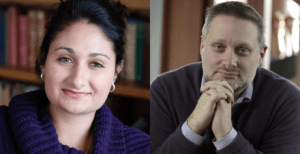If you’ve followed the political news over the past five years or so, there has been no shortage of crazy news stories and conspiracy theories. But why have so many of those been tied to antisemitism?
Carleton College Professor Christina Farhart may have some answers. She will be part of the Shir Tikvah Congregation Brave Questions series on Wednesday, March 31. The Zoom event is from 7-8 p.m.
“This came from my own deep, personal curiosity,” Latz said. “How do political conspiracies form? And how do they have staying power and traction? And what role does antisemitism play?”
Latz points out the rise in the past several years about political conspiracies gaining traction, especially in the time of COVID, and those that seemingly helped fuel the Jan. 6 insurrection at the Capitol. “We should understand this,” he said. “We have a local person who is an expert in political conspiracy theories, it was an easy ask.”
Farhart has a Ph.D. in political science with a Ph.D. minor in political psychology. She said her work on conspiracy theories and misinformation has been a passion project of hers and her dissertation adviser that they’ve worked on since 2012.

Professor Christina Farhart will speak with Rabbi Michael Latz on March 31.
“Conspiracy theories or propaganda or disinformation or misinformation, none of this is really new,” she said. “The new piece is its proliferation across social media and the internet. And it doesn’t help that political elites and social influencers, also social media, have spurred this along so much as it has been over the last few years.”
While Farhart’s team doesn’t focus on historical impact, she acknowledges that antisemitism within political conspiracies is hardly a new thing.
“It is deeply-situated historically,” she said. “A lot of the longer-standing conspiracy theories that we think of, particularly the ones that are globally-situated, are deeply tied to antisemitic beliefs: anti-elites, anti-political power, global influence, global organizations controlling all the things, that’s all deeply tied to other historical contexts that are tied to antisemitic beliefs.”
Most recently, Farhart said, those descriptors describe the Qanon conspiracy, which she says is akin to a social movement, but she isn’t willing to call it that.
“It has more groupiness to it than a lot of other conspiracy theories do,” she said. “But there’s more attention and salience that’s been paid to it and how it’s emerged in politics.”
Farhart said one of the things she’s hoping the event can talk about is the idea that conspiracy theories are for political losers.
“For folks who perceive themselves to be on the losing side of politics, they tend to generate and engage in more conspiracy beliefs to make their political opposition look bad,” she said. “Part of the debate that our literature in academics is having is whether or not the political right engages in this more frequently, if they just happen to be more prone to these types of beliefs, or is it something that it just happens to be more due to context?”
Latz said part of the importance of the event is to understand how political conspiracies intersect with antisemitism, but also other marginalized groups.
“The shooting in Atlanta (on March 16) doesn’t seem like a political conspiracy theory, but there’s certainly racism and sexism and classism all wrapped up into it,” Latz said. “So when we have these violent attacks, what is fueled by political conspiracy, and what is simply fueled by out and out racism and sexism and xenophobia? It’s pretty clear to me as a rabbi and as a leader in the community that in order to be able to work with each other, we have to understand what’s going on and what’s driving this.”

















